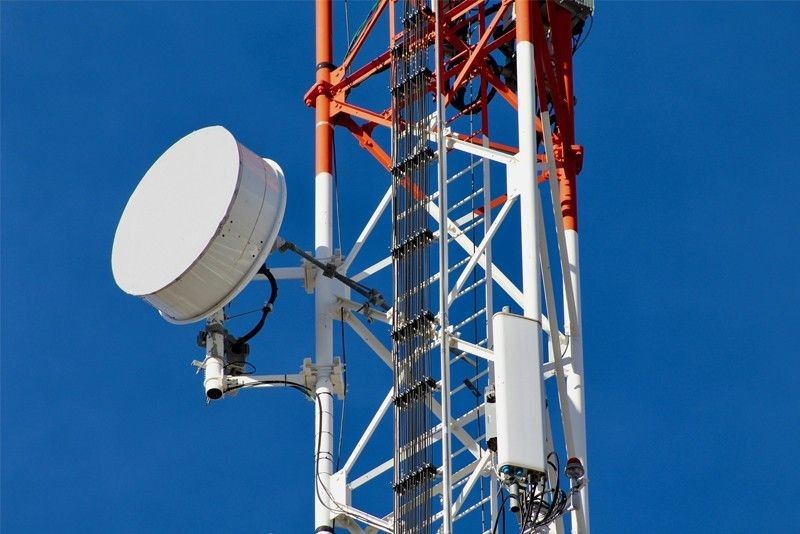‘No mercy for local execs delaying telco permits’

MANILA, Philippines — President Duterte has vowed “no mercy” for officials who delay the processing of permits for cell sites as local governments scramble to comply with his demand for prompt action on pending applications.
At a meeting of the government’s pandemic task force in Davao City last Monday, Interior Secretary Eduardo Año reported that 1,502 of 1,930 applications by telecommunication firms have been approved in 80 local government units.
“Only 428 applications are pending and we are monitoring them to ensure that they won’t be delayed because under the old system, the process lasts for 241 days and involves 19 permits and 86 document requirements,” Año told Duterte.
“Under the new system you are implementing, they only have 16 days and only eight permits are needed, requiring 35 documents,” he added.
Año said the government would remain vigilant to ensure that applications are promptly acted upon by local officials.
“We will ensure that they are approved and if not, we should know the reason why they are not approved. The process involved in the applications of telcos will be faster,” the interior chief said.
Duterte said telcos are having a hard time setting up communication towers because of the numerous requirements imposed by local governments. He said local governments should not make it hard for telcos to comply with requirements, as Filipinos would face difficulties in their work if they do not have access to telecommunication services.
“I am happy with the work of Secretary Año. I will really run after you and there will be no pleadings. I will show no mercy, even if you are my supporter, even if you helped me during the election. I tell you, the best way to help me is not to make it hard for the government to act, and these are the projects of the government,” Duterte said.
“Now, if you get caught, you would suffer. I tell you... I have never been serious as I can ever be in my life, do not commit a mistake or I would really run after you until you land in jail. The punishment for graft and corruption is harsh,” he added.
Duterte said a 200-day delay in the processing of permits is “totally unacceptable.”
“Although private companies are the ones involved in the actual building of tower, it is still a project of the government. They are commissioned and paid by the government exactly to do what they are supposed to do, to (build) the towers, to (have) a subdivision, getting a conversion from the council, most of them from the city and municipal council,” the President said.
“Do not give me that s*** that it would take you that long or I will file charges against all of you,” he added.
At a recent meeting with Duterte, Globe Telecom president Ernest Cu said telcos were encountering issues when seeking permits to build communication towers, including requirements that are not standardized.
Greater cooperation
With physical distancing now a way of life, the government and the private sector should work together more vigorously in ensuring reliable internet connectivity so that Filipinos can easily transition to online modes of transactions, Sen. Bong Go said yesterday.
“This is the new norm. Fast and reliable internet is a necessity. The Philippines should not be lagging behind since this is an important development for Filipinos,” he said.
“I myself am having difficulty with my internet connection. Our Senate sessions, hearings and meetings are all virtual in compliance with social distancing measures. Slow internet speed and unreliable connection affect work performance,” he pointed out.
Go lauded the Anti-Red Tape Authority (ARTA)’s latest directive aimed at accelerating the rollout of telecommunication infrastructure and service projects in the Philippines.
A joint memorandum circular, currently being drafted by a task force composed of ARTA, the Department of the Interior and Local Government and the Department of Information and Communications Technology, aims to fast-track the construction of telecom towers.
By providing wider and more reliable access to the internet, Go believes educational institutions will have more flexibility to implement a blended learning approach which integrates both online and offline modes of learning for students in any part of the country.
The Department of Education and the Commission on Higher Education maintain there will be no regular face-to-face classes when the school year resumes on Aug. 24. Instead, all educational institutions shall resume remotely through online platforms, learning management systems and take-home packets, among others.
“Although we don’t want to delay the opening of classes, it’s important that our students are safe. That’s our first consideration,” he said.
“For me, no vaccine, no physical classes or face-to-face learning,” said Go, who also serves as chair of the Senate committee on health and demography.
Go also acknowledged the ongoing crisis has laid bare the need to digitize other transactions that used to be handled in person. The senator, who has been pushing for the transition to e-government platforms, expressed his support for the President’s call to improve the accessibility, efficiency and transparency of all government services through e-governance.
Go filed Senate Bill No. 1738 or the E-Governance Act of 2020, which mandates the establishment of an integrated, interconnected and interoperable internal government network.
“In an age where almost everything can be done online and through other digital platforms, the government must harness the power of information and communications technology to better serve its purpose and bring the government closer to the people,” said Go.
“We need to evolve – businesses are already transitioning to e-commerce and online transactions. Our education system is also championing blended learning. It is important for the government as a whole to expedite its transition as well,” Go explained. – Cecille Suerte-Felipe
- Latest
- Trending





























